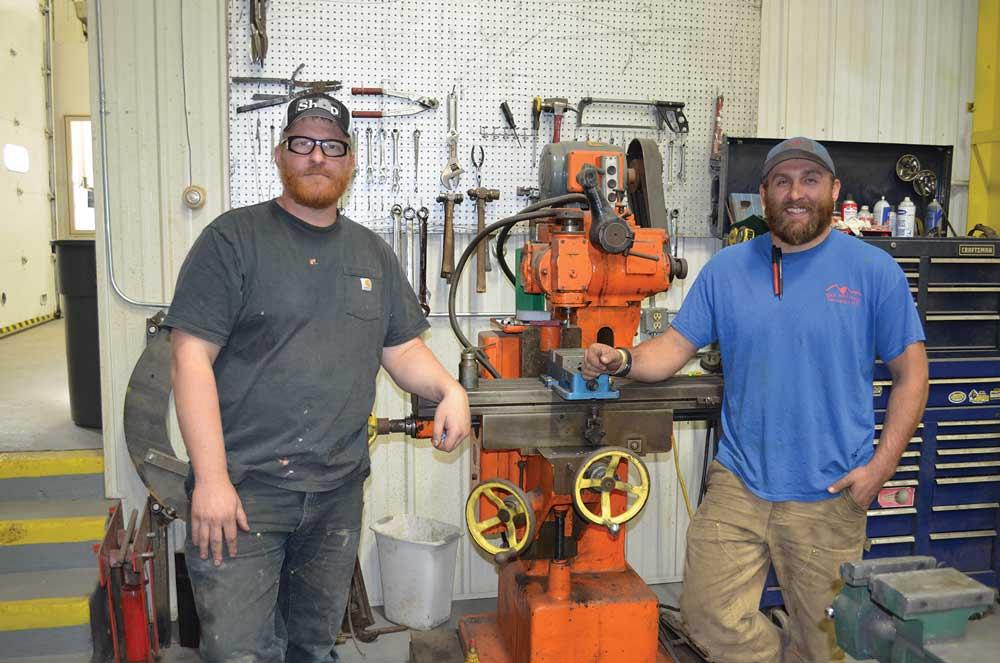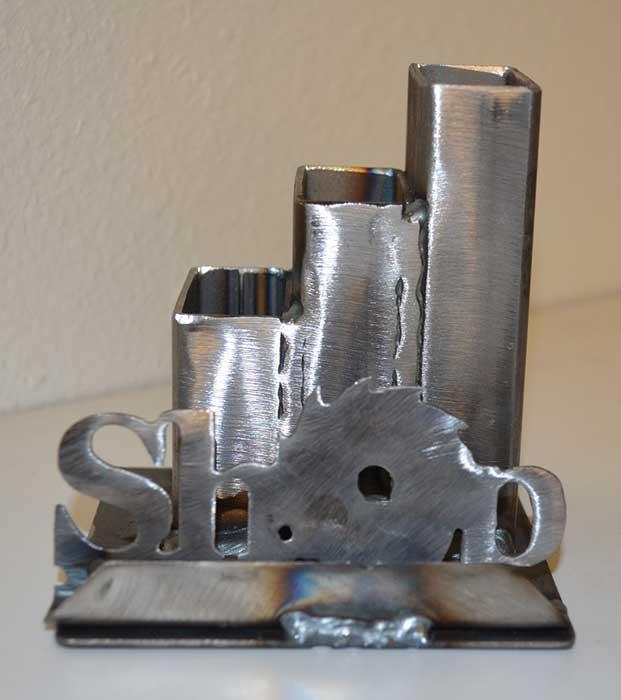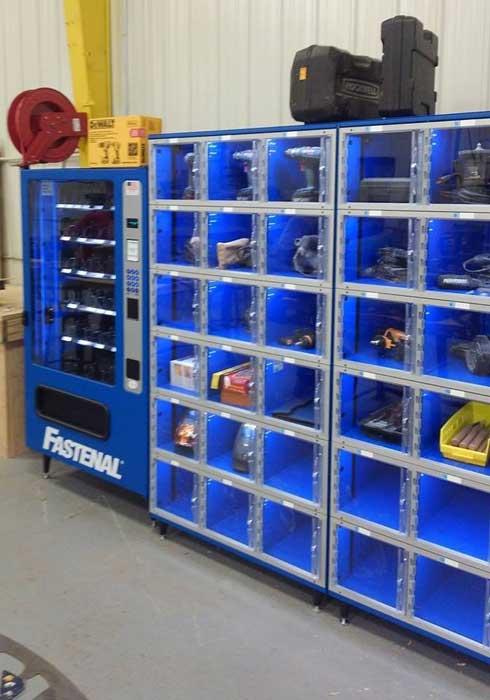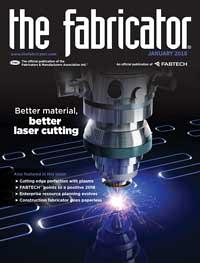Editor-in-Chief
- FMA
- The Fabricator
- FABTECH
- Canadian Metalworking
Categories
- Additive Manufacturing
- Aluminum Welding
- Arc Welding
- Assembly and Joining
- Automation and Robotics
- Bending and Forming
- Consumables
- Cutting and Weld Prep
- Electric Vehicles
- En Español
- Finishing
- Hydroforming
- Laser Cutting
- Laser Welding
- Machining
- Manufacturing Software
- Materials Handling
- Metals/Materials
- Oxyfuel Cutting
- Plasma Cutting
- Power Tools
- Punching and Other Holemaking
- Roll Forming
- Safety
- Sawing
- Shearing
- Shop Management
- Testing and Measuring
- Tube and Pipe Fabrication
- Tube and Pipe Production
- Waterjet Cutting
Industry Directory
Webcasts
Podcasts
FAB 40
Advertise
Subscribe
Account Login
Search
Black Hills Metal Fabrications welcomes the makers
In an attempt to grow the business, a small fab shop in Rapid City, S.D., opens its doors to would-be fabricators
- By Dan Davis
- January 5, 2018
- Article
- Shop Management

Figure 1
James Krause and Chance Cunningham decided to start Black Hills Metal Fabrications after getting to know each other in college and pooling their money to buy a GTAW power source. Joined later by partner Mike Billars, they opened the shop in 2013. Today they have launched a side business called The Shop, where they are introducing people to metal- and woodworking.
If a fabricator is a maker, does that make all makers fabricators?
In theory, the answer is “yes,” but no one is going out of their way to pay these makers. Fabricators still know how to bend, cut, form, and join metals in the way necessary to make a living doing it.“Makers” emerged as a term in the mid- to late 2000s to describe the crowd that embraced do-it-yourself technology, such as robotics and 3-D printing, that used to be found only in large manufacturing facilities and academic institutions. These folks had emerged from high-tech companies and the “hacker” culture, and they were creating their own products. Eventually the movement embraced old-school, hands-on activities, such as metal- and woodworking as well. Today these makers all have one thing in common: They like to work with their hands and create products that they can call their own.
James Krause, an owner of Black Hills Metal Fabrications, Rapid City, S.D., had little interest in this maker movement until a couple of years ago. In fact, as Krause was chatting about ways to increase business and possibly opening up his shop to the occasional inventor or metalworking hobbyist who was looking to use his shop’s tools, his friend said he should think about opening a “maker’s space.” Krause said, “What?”
He’s now gone from not knowing what the maker movement was about to actually becoming a part of it.
Trying to Build a Fabricating Business
Black Hills Metal Fabrications has officially been in business since the summer of 2013. Krause and Chance Cunningham, another owner in the business, met at the South Dakota School of Mines, where they had classes together (see Figure 1). (Mike Billars, who had worked with Krause at a previous job, joined the ownership team later.) Krause and Cunningham both grew up in families with farming backgrounds and found that they had a passion for “building stuff,” as Cunningham described it.
“We started talking about common interests, and he called me one day wanting to go in with him on purchasing a TIG welder,” Cunningham said.
Krause had a plasma cutting table that he had been making signs on as sort of a sideline hobby. After purchasing the gas tungsten arc welding (GTAW) machine, they got more serious. In addition to working on improving their welding skills, they also plotted how they could turn their bar napkin plans into a real business.
Finally, Krause said that they were able to line up some customers and take the big jump.
“It always seems like you never have enough customers. Even when you think you do, it’s probably half of what you need,” Krause said.

Figure 2
The owners of The Shop thought it might be good for participants in the beginner welding classes to have a project that they could take home with them. In this instance, it’s a pencil holder with a familiar logo.
So when you are building a fabrication business, you tend to do it all: repairs, field work, stainless steel countertops, and anything else that looks to be interesting and feasible. For Black Hills Metal Fabrications, it was no different.
As an example, Cunningham described a job that he was working on in Hill City, S.D., this past October. A customer wanted to turn a caboose into a cabin. That meant a lot of structural and ornamental metal was needed with brackets attached at various locations according to electrician and plumber directions. The parts had to be fabricated in the Rapid City shop and installed in Hill City, an hour away. The logistics meant that Cunningham was measuring everything twice in the hopes that he had to fabricate pieces just once.
Such experiences have given the Black Hills team the confidence to take on almost any job. Even if they don’t have the machine to do something like tube bending, they know someone who does. In a sense, Rapid City is more of a community than a city, and everyone knows everyone else.
“I think that’s the goal of any shop,” Krause said. “You don’t want to turn away anyone.”
That’s a very good goal for a fabrication shop, but it also can be a real pain when dealing with the reality of that level of customer service.
Opening up the Shop Doors
Any fabricator can tell you that just because opportunity is knocking, that doesn’t mean you open the front door. The customer that comes in off the street is likely to need a great deal of hand-holding, particularly if they don’t have a great depth of knowledge about metal fabricating.
For some of these random customers, a reply of “no” is a bit easier, especially when they ask to come in and use the shop’s equipment. Others aren’t so easy to turn away.
One customer wanted to build a bagel slicer that would be able to accommodate bagels that were almost double the size of a normal bagel. Another one wanted to develop a vending machine that would target health-conscious eaters.
“When you run into people like that, they are awesome to work with and it’s fun to see their ideas come to life, but it takes a lot of time,” Krause said.“We don’t have enough time to spend with those people,” Cunningham added.

Figure 3
This automated vending machine and locker system allows The Shop to focus on teaching students about the equipment they are using and the skills they are trying to develop instead of spending time on the administrative tasks associated with monitoring power tool usage and keeping track of consumables.
That got Krause to investigate the idea for a maker’s space. He visited Tech Shop in San Francisco, one location of a now-shuttered chain of shops that offered memberships to people that wanted access to metal- and wood-working equipment and classes for those interested in learning how to operate that equipment and use certain tools, and got inspired to try the idea in Rapid City.
The industrial park in which the shop is located had vacant space next door, so they rented that out to accommodate a wood shop, which has tools such as a planer, drill press, saws, a routing table, and a lathe, and an electronics room that has a laser scanner, a 3-D printer, and equipment for working with printed circuit boards. The fab shop already had the welding equipment, saw, CNC plasma cutting table, and press brakes for those interested in metalworking.
With the equipment in place and work done to get the word out, The Shop opened for business in early September. One of the first welding classes, with six open spots, was filled in four days (see Figure 2).
At the start, Krause said that The Shop was offering memberships ranging from $50 to $300, with different levels corresponding with an allowable number of weekly visits. Each member has an ID number, which is used to track the hours. Krause said the key is to have the schedule verified so that fabricating for paying customers can be addressed in a timely fashion and the other time can be dedicated to assisting and teaching members that want to make something.
To help smooth out the administrative task of tracking tool usage and providing supplies, a representative of Fastenal, a supplier of fasteners, tools, and supplies to manufacturers, suggested installing an automated locker and vending machine system (see Figure 3). To gain access to a portable saw, a member has to use his or her credit card to open the transparent door of the cubbyhole that holds the tool. To obtain gloves or consumables, such as abrasive cutting discs, the member uses a vending machine.
“When we started this, our plan was to target retirees, students, and the military because we have a big base nearby. We thought people our age in their 20s and 30s don’t really have the time,” Krause said.
“I don’t know if we have stuck to that plan,” he continued. “We have had a lot more women show up than I thought we would and not as many individual students.”
Not many have actual “making” experience, according to Cunningham. A lot want to learn welding to help them with their artistic endeavors. Some want to finish up projects that they have put off for years. Others like working on projects they have wanted to get started and, frankly, talking with others that are sort of in the same place.
“It’s a pretty big spectrum,” Cunningham said.
Looking back on the effort to get The Shop up and running, Krause and Cunningham seem satisfied with the effort. They both admit that they still need to build up the fabricating business to the point where they can enjoy more comfortable lives, but creating a maker’s space in a town of 74,000 has given them the feeling that they are not only contributing something to the local community but also are part of something that is much larger.
“It’s pretty cool to see this happening,” Krause said. “Rapid City is usually behind the times seven or eight years, so I think we’re right on track with this.”
Black Hills Metal Fabrications LLC, 605-786-8857, www.bhmetalfabricators.com
About the Author

Dan Davis
2135 Point Blvd.
Elgin, IL 60123
815-227-8281
Dan Davis is editor-in-chief of The Fabricator, the industry's most widely circulated metal fabricating magazine, and its sister publications, The Tube & Pipe Journal and The Welder. He has been with the publications since April 2002.
subscribe now

The Fabricator is North America's leading magazine for the metal forming and fabricating industry. The magazine delivers the news, technical articles, and case histories that enable fabricators to do their jobs more efficiently. The Fabricator has served the industry since 1970.
start your free subscription- Stay connected from anywhere

Easily access valuable industry resources now with full access to the digital edition of The Fabricator.

Easily access valuable industry resources now with full access to the digital edition of The Welder.

Easily access valuable industry resources now with full access to the digital edition of The Tube and Pipe Journal.
- Podcasting
- Podcast:
- The Fabricator Podcast
- Published:
- 04/16/2024
- Running Time:
- 63:29
In this episode of The Fabricator Podcast, Caleb Chamberlain, co-founder and CEO of OSH Cut, discusses his company’s...
- Trending Articles
Tips for creating sheet metal tubes with perforations

JM Steel triples capacity for solar energy projects at Pennsylvania facility

Are two heads better than one in fiber laser cutting?

Supporting the metal fabricating industry through FMA

Omco Solar opens second Alabama manufacturing facility

- Industry Events
16th Annual Safety Conference
- April 30 - May 1, 2024
- Elgin,
Pipe and Tube Conference
- May 21 - 22, 2024
- Omaha, NE
World-Class Roll Forming Workshop
- June 5 - 6, 2024
- Louisville, KY
Advanced Laser Application Workshop
- June 25 - 27, 2024
- Novi, MI


























